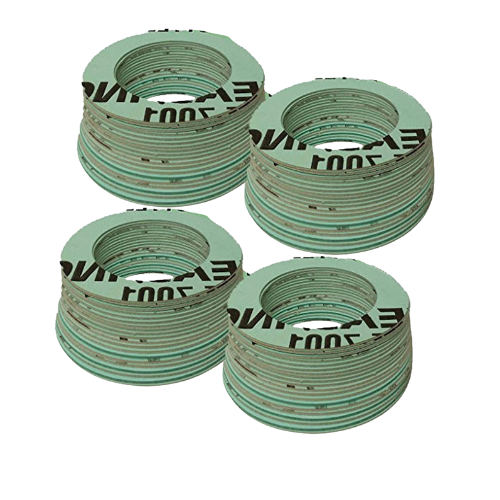Asbestos Gaskets: Versatile Sealing Solutions for High-Performance Applications
Asbestos gaskets have long been valued for their durability, heat resistance, and effectiveness in industrial applications. Despite the rising shift to non-asbestos alternatives due to health concerns, asbestos gaskets remain an essential sealing solution in certain legacy systems and demanding environments. In this blog, we’ll explore the features, advantages, applications, and safety considerations of asbestos gaskets, as well as insights into alternatives that maintain comparable performance.
What Are Asbestos Gaskets?
Asbestos gaskets are made from asbestos fibers blended with other materials like rubber, graphite, or metal. These fibers provide excellent heat resistance, tensile strength, and sealing capabilities, making them suitable for high-pressure and high-temperature environments.
Asbestos gaskets are typically classified into two types:
- Compressed Asbestos Fiber (CAF) Gaskets: These are produced by compressing asbestos fibers with binding agents like rubber for added flexibility and resilience.
- Asbestos Rope Gaskets: Used in high-temperature applications, these are made from braided or woven asbestos fibers.
Key Features of Asbestos Gaskets
1. Exceptional Heat Resistance
- Operate effectively at temperatures exceeding 500°C.
- Ideal for applications involving steam, hot gases, or high-temperature fluids.
2. Superior Durability
- Withstand harsh operating conditions, ensuring a long service life.
3. Chemical Resistance
- Resistant to oils, solvents, and chemicals, making them versatile in industrial environments.
4. Pressure Tolerance
- Perform well under extreme pressure, maintaining a reliable seal.
5. Low Compression Set
- Retain their shape and sealing performance over time, reducing maintenance needs.
Applications of Asbestos Gaskets
1. Power Plants
- Used in boilers, heat exchangers, and turbines where extreme temperatures and pressures prevail.
2. Chemical Processing
- Provide reliable sealing in pipelines and equipment handling aggressive chemicals.
3. Oil and Gas Industry
- Used in refining, drilling, and transportation systems.
4. Automotive Sector
- Historically used in engine manifolds and exhaust systems due to their heat resistance.
5. Shipbuilding and Marine Applications
- Ensure tight seals in engines and high-pressure steam systems.
Advantages of Asbestos Gaskets
1. Cost-Effectiveness
- Economical compared to many high-performance non-asbestos alternatives.
2. High-Temperature Sealing
- Performs in extreme heat conditions where other gasket materials might fail.
3. Versatility
- Suitable for a range of media, including steam, oil, and chemical fluids.
4. Long Service Life
- Resilient under continuous exposure to harsh conditions.
Safety and Regulatory Concerns
Health Risks of Asbestos Exposure
While asbestos gaskets are efficient, their use comes with health risks. Asbestos fibers, when disturbed, can become airborne and pose respiratory hazards, including asbestosis and mesothelioma.
Regulatory Measures
- Many countries have restricted or banned the use of asbestos products.
- Industrial users must adhere to strict safety guidelines for handling, installation, and disposal.
Safe Handling Practices
- Use Proper PPE: Wear respirators, gloves, and protective clothing when working with asbestos gaskets.
- Follow Local Regulations: Ensure compliance with governmental and industrial asbestos safety standards.
- Opt for Professional Services: Engage certified professionals for gasket removal or replacement.
Non-Asbestos Alternatives
In response to safety concerns, non-asbestos gaskets have become widely available. These alternatives deliver comparable performance without health risks.
Common Non-Asbestos Materials:
- Graphite: Offers excellent heat and chemical resistance, ideal for high-temperature applications.
- PTFE (Teflon): Provides superior chemical resistance for aggressive fluids.
- Aramid Fiber: A durable and heat-resistant material used in various industrial sealing solutions.
- Flexible Metal Gaskets: Combine heat resistance with mechanical strength for demanding environments.
Why Choose Rubber Seals and Gaskets for Your Sealing Needs?
At Rubber Seals and Gaskets, we prioritize safety and performance. Whether you’re looking for asbestos gaskets for legacy systems or non-asbestos alternatives for modern applications, we deliver solutions tailored to your needs.
What Sets Us Apart?
- Quality Assurance: All our products meet stringent industry standards.
- Diverse Range: From asbestos gaskets to cutting-edge non-asbestos materials, we’ve got it all.
- Expert Guidance: Our team helps you choose the right gasket for your application.
- Sustainability Commitment: We promote safe and eco-friendly sealing solutions.
Conclusion
Asbestos gaskets have historically been a reliable sealing solution in industries requiring exceptional heat and pressure tolerance. However, with growing awareness of asbestos-related health risks, industries are shifting towards safer non-asbestos alternatives.
For legacy systems still relying on asbestos gaskets or for transitioning to modern, non-asbestos solutions, Rubber Seals and Gaskets is your trusted partner. Our expert team and diverse product range ensure that your industrial systems remain safe, efficient, and compliant.

FAQs
Yes, they are used in some legacy systems and specialized applications where alternatives are not feasible.
When disturbed, asbestos fibers can become airborne, posing serious respiratory health hazards.
Non-asbestos alternatives like graphite, PTFE, aramid fiber, and flexible metal gaskets offer comparable performance without health risks.
For more information on asbestos gaskets and modern sealing solutions, contact Rubber Seals and Gaskets today!
